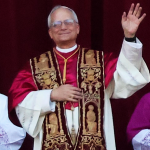I’ve now had a chance to read the “Evangelical Manifesto” that we discussed earlier.
It’s rather well done and there’s much to commend here. The concluding “Invitation to All” is particularly welcome. So too is what is probably the document’s strongest contribution and best hope for achieving what it seeks to accomplish, namely its tone, which is reasonable and almost aggressively civil.
I’m also quite pleased to find that this document, endorsed by some notable and influential leaders in American evangelicalism, includes concern for the poor and the powerless as non-negotiable hallmarks of the faith. And I’m even more pleased that it does so without any sense that such commitments must be over-defended as matters of “controversy.” Ditto for the manifesto’s repeated references to the stewardship of creation and its fleeting, but welcome, endorsement of “a high view of science” and condemnation of the oppression of women.
There are also several points on which I disagree with the writers and several more points I would need to ask them to clarify. Here, for example:
All too often we have tried to be relevant, but instead of creating “new wineskins for the new wine,” we have succumbed to the passing fashions of the moment and made noisy attacks on yesterday’s errors, such as modernism, while capitulating tamely to today’s, such as postmodernism.
The writers here seem to be endorsing something other than “modernism” or “postmodernism,” but what that might be isn’t quite clear. The logical implication would seem to be pre-modernism, but I’m fairly sure that’s not what they mean either.
Postmodern there seems to be a bogeyman word meaning, I take it, all the bad things that it might possibly mean and none of the good. (That’s a bit odd in a document that otherwise seems to borrow an awful lot from Stanley Hauerwas.)
Elsewhere the document criticizes fundamentalism as “an essentially modern reaction to the modern world.” That’s astute, but it’s difficult to understand such a critique if a discussion of the failures of modernism, i.e., postmodernism, is forbidden as “error.” My best guess here is that what the writers are really on about is what they earlier condemn as “an inadequate view of truth.” Their dedication to truth is admirable, but it’s also troublesome throughout the document due to their own inadequate view of uncertainty.
One gets the sense that one is reading a document written by people who automatically translate “we cannot be certain” into “there is no truth.” This makes it difficult for someone like me, who believes the former but not the latter, to engage what they’re saying. In any case a bit of humble, postmodern, chastened, glass-darkly epistemology might have helped to rescue the manifesto’s discussion of sola scriptura, which seems premised on the idea that certainty is readily and easily available to us humans. (That notion strikes me as, to borrow a phrase, “an essentially modern reaction to the modern world.”)
The other bogeyman word here seems to be “secularism.” Making this a bogeyman word leads to some serious confusion in the section of the manifesto subtitled, “A civil rather than a sacred or naked public square.” What they’re advocating here is secularism, but they’ve decided they can’t call it that, so instead we get a page and a half endorsing secularism and the separation of church and state while simultaneously condemning “secularism” and the “strict separation of church and state.” It isn’t pretty.
The language they are thus forced to rely on comes from the man who led them into this linguistic mess, from Richard John Neuhaus and his book The Naked Public Square. Neuhaus’ big idea there was that secularism is, itself, a kind of religion. Thus, for Neuhaus, a non-sectarian government is really sectarian — it sides with and privileges non-sectarianism as a kind of state religion. The refusal to impose state-sanctioned sectarian prayer on public school students is thus, in this view, an establishment of the “religion” of secularism. And the refusal to accede to a sectarian argument based primarily on the particular tenets of a sect is thus mere bigotry.
That’s just a slightly more sophisticated version of the whole “your ‘tolerance’ is really just intolerance of my intolerance” shtick, the boilerplate nonsense of bigots attempting to pose as victims. Since the writers of the “Evangelical Manifesto” explicitly condemn “posing as victims” for political gain, they might want to rethink relying on Neuhaus here for the framing of this question.
Where the manifesto ends up on the matter is this:
Our commitment is to a civil public square — a vision of public life in which citizens of all faiths are free to enter and engage the public square on the basis of their faith, but within a framework of what is agreed to be just and free for other faiths too.
“A civil public square” providing a “framework of what is agreed to be just and free” to “citizens of all faiths” regardless of sectarian particulars. If I were on the “$25,000 Pyramid” and Betty White said all that to me, I’d be shouting “secularism! … separation of church and state!”
But here’s my biggest problem with the document. “Contrary to widespread misunderstanding today, we Evangelicals should be defined theologically, and not politically, socially or culturally,” it says on page 4. “Evangelicalism must be defined theologically and not politically; confessionally and not culturally,” it repeats on page 8.
Amen and amen. But then on page 13 it says this:
We call for an expansion of our concern beyond single-issue politics, such as abortion and marriage, and a fuller recognition of the comprehensive causes and concerns of the Gospel, and of all the human issues that must be engaged in public life. Although we cannot back away from our biblically rooted commitment to the sanctity of every human life, including those unborn, nor can we deny the holiness of marriage as instituted by God between one man and one woman …
The “A-word” is out of the bag, and I don’t suppose there’s anything I could write here to prevent that from becoming the sole and heated topic in the comment thread below, but my point here is not the substance of the anti-abortion and anti-gay stances that the authors say they “cannot back away from.” Nor do I want to get distracted by the question of whether or not “the holiness of marriage as instituted by God” would be an adequate line of argument “within a framework of what is agreed to be just and free for other faiths too.”
My point here is the authors’ perception, probably correct, that their call to move “beyond single-issue politics” needed to be followed immediately by an emphatic demonstration of their agreement with the majority of Evangelicals on those two issues. This document is not about those two things, but the authors recognize that unless they reaffirm these positions on these two issues, then none of the people they’re trying to reach will listen to another word they say.
Please don’t misunderstand me. I’m not questioning the sincerity of the authors and signatories when they reaffirm these political stances. I am sure they are being perfectly sincere. But what is it that they are doing here with such sincerity? What is the purpose of this ritual reaffirmation?
The authors affirm that they oppose abortion and same-sex marriage in order to demonstrate that they belong, to demonstrate that their voices are legitimate voices in their community, to demonstrate that they are “Evangelicals.” And what is the key, the touchstone, the Shibboleth for that demonstration? Two, and only two, political opinions. To be anti-abortion and anti-homosexuality may not be sufficient to demonstrate that one is an Evangelical, but it is necessary — far more necessary than any given theological or confessional belief.
The manifesto’s splendid language about reaching out to “the poor, the sick, the hungry, the oppressed, the socially despised, and being faithful stewards of creation and our fellow-creatures” belongs to a different category. Such opinions are acceptable, perhaps even admirable, but they are not Shibboleths that demonstrate one’s valid membership in the community.
Here, then, is the “Evangelical Manifesto.” It is an often persuasive and eloquent argument that political and cultural definitions of “Evangelical” are illegitimate. Yet even here — in the midst of that argument — the authors cannot avoid bowing to the demands of exactly those political and cultural definitions.
















